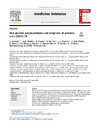Please use this identifier to cite or link to this item:
https://accedacris.ulpgc.es/jspui/handle/10553/106216
| Title: | HLA genetic polymorphisms and prognosis of patients with COVID-19 | Other Titles: | Polimorfismos genéticos de los HLA y pronóstico de pacientes con COVID-19 | Authors: | Lorente, L. Martín, M.M. Franco, A. Barrios, Y. Cáceres, J. J. Sole Violan, Jorge Pérez, A. Marcos y Ramos, J.A. Ramos Gómez, L. Ojeda, N. Jiménez, A. Lorente, Leonardo Franco, Andrés Barrios, Yvelise Perez, Alina Jiménez, Alejandro Pérez-Cejas, Antonia Pérez-Llombet, Alejandra Uribe, Luis González, Lourdes Alvarez, Rocío Martín, María M. Alcoba-Flórez, Julia Estupiñan, Albano Cáceres, Juan J. Vega, Paula Gonzalez, Lucía Solé-Violán, Jordi Ojeda, N. Jiménez, A. Rodríguez Pérez, Aurelio Eduardo Domínguez Cabrera, Casimira Marcos y Ramos, José Alberto Zapata, María F. Ramos Gómez, Luis Ortiz López, Raquel |
UNESCO Clasification: | 32 Ciencias médicas 3202 Epidemologia 320102 Genética clínica |
Keywords: | HLA Genetic polymorphisms COVID-19 Mortality Outcome |
Issue Date: | 2021 | Journal: | Medicina Intensiva | Abstract: | Objective.
Different genetic polymorphisms of human leukocyte antigen (HLA) have been associated with the risk and prognosis of autoimmune and infectious diseases. The objectives of this study were to determine whether there is an association between HLA genetic polymorphisms and the susceptibility to and mortality of coronavirus disease 2019 (COVID-19) patients.
Design.
Observational and prospective study.
Setting.
Eight Intensive Care Units (ICU) from 6 hospitals of Canary Islands (Spain).
Patients.
COVID-19 patients admitted in ICU and healthy subjects.
Interventions.
Determination of HLA genetic polymorphisms.
Main variable of interest.
Mortality at 30 days.
Results.
A total of 3886 healthy controls and 72 COVID-19 patients (10 non-survivors and 62 survivor patients at 30 days) were included. We found a trend to a higher rate of the alleles HLA-A*32 (p=0.004) in healthy controls than in COVID-19 patients, and of the alleles HLA-B*39 (p=0.02) and HLA-C*16 (p=0.02) in COVID-19 patients than in healthy controls; however, all these p-values were not significant after correction for multiple comparisons. Logistic regression analysis showed that the presence of certain alleles was associated with higher mortality, such as the allele HLA-A*11 after controlling for SOFA (OR=7.693; 95% CI=1.063–55.650; p=0.04) or APACHE-II (OR=11.858; 95% CI=1.524–92.273; p=0.02), the allele HLA-C*01 after controlling for SOFA (OR=11.182; 95% CI=1.053–118.700; p=0.04) or APACHE-II (OR=17.604; 95% CI=1.629–190.211; p=0.02), and the allele HLA-DQB1*04 after controlling for SOFA (OR=9.963; 95% CI=1.235–80.358; p=0.03).
Conclusions.
The new finding from our preliminary study of small sample size was that HLA genetic polymorphisms could be associated with COVID-19 mortality; however, studies with a larger sample size before definitive conclusions can be drawn. Objetivo. Diferentes polimorfismos genéticos de los antígenos leucocitarios humanos (HLA) están asociados con el riesgo y el pronóstico de enfermedades autoinmunes e infecciosas. Los objetivos de estudio fueron determinar si existe una asociación entre polimorfismos genéticos de HLA y la susceptibilidad y mortalidad de pacientes con la enfermedad del coronavirus 2019 (COVID-19). Diseño. Estudio observacional y prospectivo. Ámbito. Ocho unidades de cuidados intensivos (UCI) de 6 hospitales de las Islas Canarias (España). Pacientes. Pacientes COVID-19 ingresados en la UCI y sujetos sanos. Intervenciones. Se determinaron los polimorfismos genéticos de los HLA. Variable de interés principal. Mortalidad a los 30 días. Resultados. Se incluyeron 3.886 sujetos sanos y 72 pacientes COVID-19 (10 fallecidos y 62 supervivientes a 30 días). Encontramos una tendencia a una mayor frecuencia de los alelos HLA-A*32 (p=0,004) en sujetos sanos que en pacientes COVID-19, y de los alelos HLA-B*39 (p=0,02) y HLA-C*16 (p=0,02) en pacientes COVID-19 que en sujetos sanos; sin embargo, no fueron significativos al corregir por comparaciones múltiples. En la regresión logística encontramos que la presencia de ciertos alelos estuvo asociada con mayor mortalidad, como el alelo HLA-A*11 controlando por SOFA (OR=7.693; IC del 95%=1.063-55.650; p=0,04) o APACHE-II (OR=11.858; IC del 95%=1.524-92.273; p=0,02), el alelo HLA-C*01 controlando por SOFA (OR=11.182; IC del 95%=1.053-118.700; p=0,04) o APACHE-II (OR=17.604; IC del 95%=1.629-190.211; p=0,02) y el alelo HLA-DQB1*04 controlando por SOFA (OR=9.963; IC del 95%=1.235-80.358; p=0,03). Conclusiones. Los nuevos hallazgos de nuestro preliminar estudio de pequeño tamaño muestral fueron que determinados polimorfismos genéticos de los HLA podrían estar asociados con la mortalidad de pacientes COVID-19; sin embargo, son necesarios estudios de mayor tamaño muestral para concluirlo definitivamente. |
URI: | https://accedacris.ulpgc.es/handle/10553/106216 | ISSN: | 0210-5691 | DOI: | 10.1016/j.medin.2020.08.004 | Source: | Medicina Intensiva [ISSN 0210-5691], v. 45 (2), p. 96-103, Marzo 2021 |
| Appears in Collections: | Artículos |
WEB OF SCIENCETM
Citations
93
checked on Feb 1, 2026
Page view(s)
353
checked on Jan 16, 2026
Download(s)
560
checked on Jan 16, 2026
Google ScholarTM
Check
Altmetric
Share
Export metadata
Items in accedaCRIS are protected by copyright, with all rights reserved, unless otherwise indicated.
